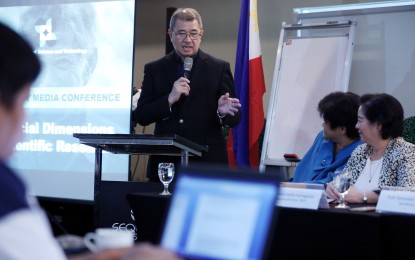
MANILA – Department of Science and Technology (DOST) Secretary Fortunato dela Peña said the agency has submitted a proposal for possible legislation for the establishment of a virology institute in the country.
In his social media post over the weekend, dela Peña said the Virology Science and Technology Institute of the Philippines (VIP) would be a premier research institute in virology and diseases in humans, animals, and plants.
Studies would focus on viral ecology, clinical virology, vector transmission, pathogenesis, pathophysiology, among others.
The establishment of the VIP would also be for the development of vaccines, diagnostics, and therapeutics, he added.
"It will conduct innovative scientific research on viral agents requiring high or maximum containment (biosafety level-2 to biosafety level-4) following the World Health Organization's guidelines on the establishment of a virology laboratory in developing countries,” his post read.
Dela Peña said he envisions partnerships with other scientists and virology centers in other countries in doing researches.
Meanwhile, the VIP would cater to researches on viral diseases and pathogens. These may include enteric infections, respiratory infections, central nervous system infections, viral infections in the immunocompromised host, and antiviral and antimicrobial resistance.
Viral diversity, plant pathology, and plant–virus interactions, as well as major plant viruses are also included, he said. (PNA)
In his social media post over the weekend, dela Peña said the Virology Science and Technology Institute of the Philippines (VIP) would be a premier research institute in virology and diseases in humans, animals, and plants.
Studies would focus on viral ecology, clinical virology, vector transmission, pathogenesis, pathophysiology, among others.
The establishment of the VIP would also be for the development of vaccines, diagnostics, and therapeutics, he added.
"It will conduct innovative scientific research on viral agents requiring high or maximum containment (biosafety level-2 to biosafety level-4) following the World Health Organization's guidelines on the establishment of a virology laboratory in developing countries,” his post read.
Dela Peña said he envisions partnerships with other scientists and virology centers in other countries in doing researches.
Meanwhile, the VIP would cater to researches on viral diseases and pathogens. These may include enteric infections, respiratory infections, central nervous system infections, viral infections in the immunocompromised host, and antiviral and antimicrobial resistance.
Viral diversity, plant pathology, and plant–virus interactions, as well as major plant viruses are also included, he said. (PNA)
